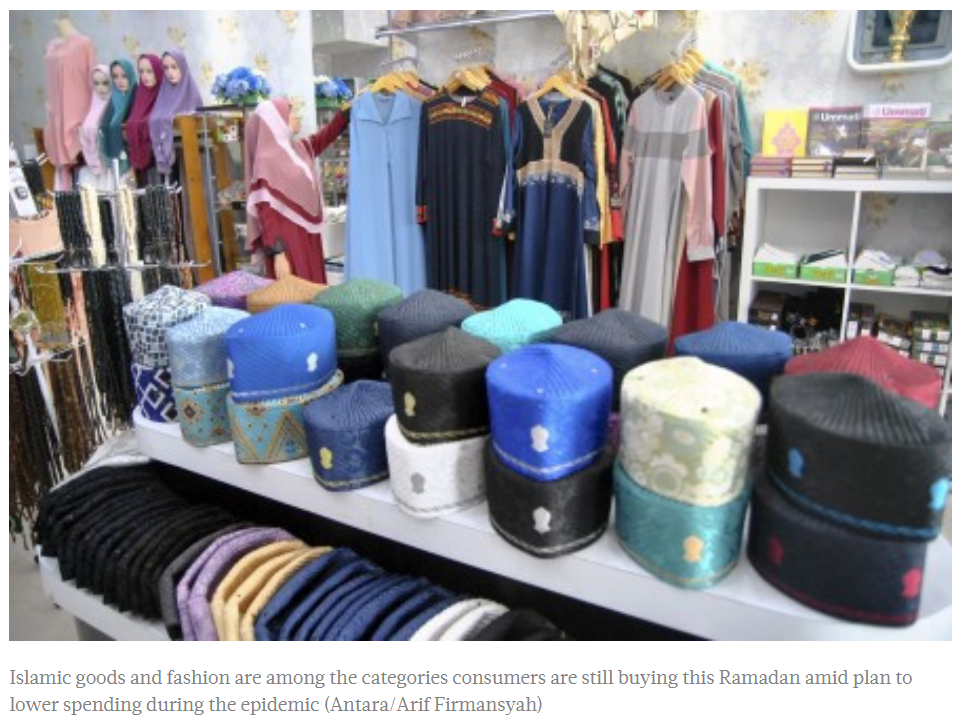Indonesia: Consumers still shopping for Ramadan fashion despite reduced holiday spending
Many people still plan to buy Islamic goods and fashion items for the Ramadan fasting season despite an overall decline in consumer spending caused by growing financial insecurity amid the COVID1-19 pandemic, a survey has indicated.
While fashion items remain on consumers’ shopping lists, purchases of recreational and luxury items such as jewelry and smartphones are expected to decline sharply, according to the survey conducted by the Mobile Marketing Association (MMA) and SurveySensum.
SurveySensum founder and CEO Rajiv Lamba said that the overall value of the consumer’s Ramadan shopping basket was expected to go down by 32 percent with lower spending on leisure travel partly as a result of the decline in earnings and Idul Fitri holiday bonuses (THR).
“People are postponing buying discretionary items until after the epidemic is over. This could be bad news for the automotive, electronics and also retail categories to some extent,” he said in a webinar on Monday.
“The trend is especially true for big cities which are impacted the most by job cuts,” he continued, adding that the middle-income group in the Greater Jakarta area was reportedly reducing its spending by 36 percent, compared with 27 percent outside of the region.
Consumers are increasingly worried as they expect the situation be the norm for 3.2 months, compared with the two months expectation they had last month. As such, the survey also revealed a 6-percentage point increase in consumer worries over financial security to 44 percent in April from 38 percent last month.
Lamba went on to say that 67 percent of respondents believe their current Ramadan budget will be much less than last year with an average budget reduction of 43 percent. Meanwhile, 20 percent say they will spend the same amount and only 13 percent of consumers say they will spend more this Ramadan.
He said that spending in the digital category was expected to bloom as both upper- and middle-income respondents say they will be spending more on mobile data and home internet subscriptions, as well as moving the holiday shopping toward e-commerce and other digital platforms.
“What we already see happening is a lot of Ramadan activities such as breaking-of-the-fast gatherings are moving to online platforms,” he said, adding that consumers in the upper social economic sector would also spend more on gaming and movie streaming services.
In order to seize the opportunity, Lamba said that businesses could start by adapting to social and conversational commerce. The global MMA data showed that 63 percent of Asia Pacific consumers interact with businesses through social commerce. This percentage was higher than in Latin America (58 percent), Europe and the Middle East (42 percent), and North America (35 percent)
“Brands are connecting with these customers through Facebook Messenger, WhatsApp and other omnichannel social apps, which will be the thing of the future,” he said.
He added that businesses could learn to innovate by continuing to engage in research and development even though they are cutting costs to survive the pandemic. Lamba said that during the 2008 recession, companies that spent money on R&D showed a much better return on investment and growth post-recession.
The MMA questioned 500 people in 10 major cities namely Jakarta; Bandung, Bekasi, Bogor and Depok in West Java; Tangerang, Banten; Surabaya, East Java; Semarang, Central Java; Yogyakarta; and Medan, North Sumatra, from April 18 to 20.
Source: https://www.thejakartapost.com/news/2020/04/29/consumers-still-shopping-for-ramadan-fashion-despite-reduced-holiday-spending.html


 English
English




